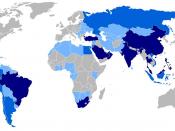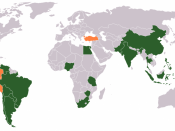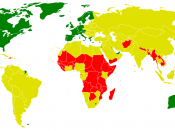In her article, ?Unmasking the population bomber,? Ann Filemyr argues that gender studies should be applied to considerations of population control, especially in developing nations, where special attention must be paid to preserving women?s rights. Filemyr dissects the ideology behind the population bomb myth. She believes that in order to mask their responsibility in consuming the world?s resources, ?gorging? countries conjure the idea that the overpopulation of developing countries is the actual problem behind scarcity of natural resources. In her eyes, equating the amount of strain on scarce recourses by the number of children produced instead of the percentage of consumption for each child is a tactic that conveniently distracts the privileged from acknowledging their own responsibility for the problem. She provides helpful examples of how the facts often contradict this misconception.
The most clear-cut of her examples was a study conducted in Brazil that showed, despite the fact that the country?s birthrate declined by half between 1960 and 1990, the country?s natural resources were vastly depleted in that time.
She notes that this was a result of development strategies that obliterated parts of the Amazon rainforest, causing problems that encompassed more than environmental concerns and included disease, social upheaval, and the dissolution of the lifestyles practiced by indigenous peoples. The picture of a third-world country?s resources being ravaged by Northern development seems obvious to those who have familiarized themselves with the negative effects of globalization. However, the idea does seem to persist in Western culture that ?pregnant dark-skinned women surrounded by their hungry hoard of children? are an extraneously damaging burden that the Earth is forced bare.
Filemyr uses a more complex example to show the unrelated nature of so-called overpopulation in developing countries to the traditional lifestyles of their people. She explains that when the Ladakhi...


